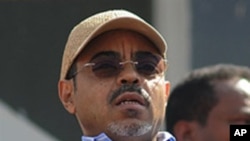Ethiopia's Prime Minister Meles Zenawi says bilateral ties with the United States are on the mend after months of tensions. Mr. Meles promised a wholesale government reshuffle due in October will include a restructuring of Ethiopia's diplomatic missions.
The Ethiopian leader told reporters Wednesday that what he called 'a rough stretch' in relations with Washington appears to be over.
"I think the rather difficult stretch we have had in the past six-seven months is by and large behind us now," he said. "There are issues on which the officials in the United States feel strongly and differently, and there are issues on which we feel strongly and differently from those of the United States. We will agree to disagree on those we do not agree on, and we agree to work together on issues of common interest."
Bilateral ties reached a low ebb last May, around the time of Ethiopia's parliamentary elections. No U.S. observer groups were present, and American embassy personnel were barred from visiting voting stations or traveling outside Addis Ababa on election day.
The White House responded with a strong statement. It said the elections had fallen short of international commitments, and criticized the Ethiopian government for failing to create an environment conducive to free and fair elections.
The relationship appeared to improve after a visit to Addis Ababa last month by Assistant Secretary of State for African Affairs Johnnie Carson.
Prime Minister Meles Wednesday defended his decision not to appoint an ambassador to Washington. The post has been vacant since last year when the previous envoy was called home.
Mr. Meles said a new ambassador would be named soon during a wholesale government reorganization.
"We are going to establish a new government in October and there is going to be a comprehensive reshuffle of individuals and so we felt it didn't make sense to appoint full time ambassadors a few months before a complete reorganization of the government," he said.
Mr. Meles said the reshuffle would include closing some foreign diplomatic missions and opening others, reflecting Ethiopia's shifting alliances. He said the embassy in Stockholm would be the first to close.
"There is no development cooperation program of any substance between us and Sweden," he said. "There is no major trading relationship between us and Sweden, and no significant investment coming from Sweden to Ethiopia. At the same time we don't have an embassy in Brazil. Brazil is a huge emerging country, and so we are now reassessing our diplomatic presence globally and the first to go was Sweden because it was not worthwhile to have an embassy there."
Mr. Meles also said Ethiopia's latest five-year economic plan envisions an end to the country's dependence on food aid. The plan unveiled last week predicts economic growth of between 11 and 14 percent a year.
"Our hope and expectation is that over the next five years we'll produce enough not only to feed ourselves but to be able to export," he said.
Ethiopia remains one of the world's poorest countries, and one of the largest foreign aid recipients. One in 10 Ethiopians receives emergency food aid.
Mr. Meles's Ethiopian People's Revolutionary Democratic Front was easily returned to power in the May elections, winning all but two of the 547 seats in parliament.




